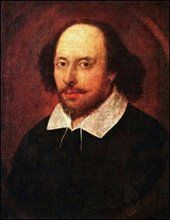
Edward, the Black Prince of Wales
Schema: Quiz
Act IV.3 of Henry V features one of Shakespeare’s great motivational speeches, Henry’s St. Crispin Day speech. The speech is before the Battle of Agincourt. The scene opens with Henry’s nobles bemoaning the number of men at hand and the condition of their army. Henry responds with the rationale that they should not want more men because there would be fewer honors for each of them, ‘the fewer men, the greater share of honor.” (IV.3, 23) It is a masterful example of motivation and manipulation (depending on your level of cynicism).
Henry’s response to Montjoy’s request for ransom and surrender is also masterful and brave. He tells him to “achieve me, and then sell my bones.” (IV.3, 92) This is done more for the benefit of his listening men than Montjoy. Both of these speeches are forms of indirect characterization.
One of the four plot elements, climax, is seen in IV.7 when the suspense, the action that has built since Act I, is relieved with Montjoy's line “The day is yours.” (86) My feeling is that this one line is the climax; all is resolved and everything going forward is driven by this climax, the ending of the conflict.
Please be aware that we are fortunate to see the full battle, in all its gore and glory. This did not happen in the play; imagination was needed to fill these scenes, which is why the Chorus keeps referencing imagination and the feeble attempt to represent the battle “[w]ith four or five most vile and ragged foils.” (IV.1, 50) By the way, foils are swords.
Fact to remember: Edward, the Black Prince of Wales (his armor was black) also beat the French in a battle similar in odds to those at Agincourt. The battle is referred to in II.4, “[w]hen Crecy battle fatally was struck.” (54) Crecy was to Edward as Agincourt was to Henry.
Act IV.3 of Henry V features one of Shakespeare’s great motivational speeches, Henry’s St. Crispin Day speech. The speech is before the Battle of Agincourt. The scene opens with Henry’s nobles bemoaning the number of men at hand and the condition of their army. Henry responds with the rationale that they should not want more men because there would be fewer honors for each of them, ‘the fewer men, the greater share of honor.” (IV.3, 23) It is a masterful example of motivation and manipulation (depending on your level of cynicism).
Henry’s response to Montjoy’s request for ransom and surrender is also masterful and brave. He tells him to “achieve me, and then sell my bones.” (IV.3, 92) This is done more for the benefit of his listening men than Montjoy. Both of these speeches are forms of indirect characterization.
One of the four plot elements, climax, is seen in IV.7 when the suspense, the action that has built since Act I, is relieved with Montjoy's line “The day is yours.” (86) My feeling is that this one line is the climax; all is resolved and everything going forward is driven by this climax, the ending of the conflict.
Please be aware that we are fortunate to see the full battle, in all its gore and glory. This did not happen in the play; imagination was needed to fill these scenes, which is why the Chorus keeps referencing imagination and the feeble attempt to represent the battle “[w]ith four or five most vile and ragged foils.” (IV.1, 50) By the way, foils are swords.
Fact to remember: Edward, the Black Prince of Wales (his armor was black) also beat the French in a battle similar in odds to those at Agincourt. The battle is referred to in II.4, “[w]hen Crecy battle fatally was struck.” (54) Crecy was to Edward as Agincourt was to Henry.

No comments:
Post a Comment